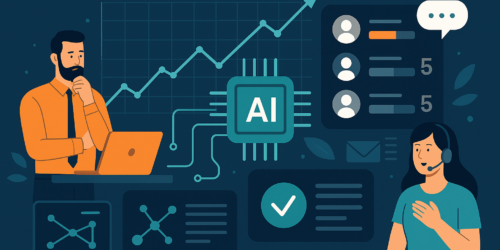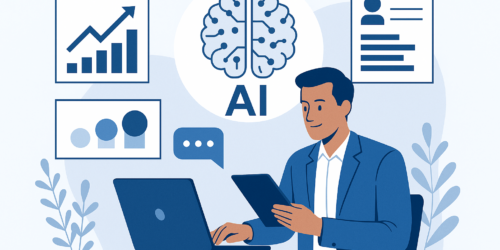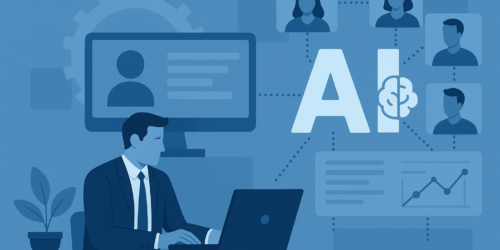What's in this article?
The landscape of sales is rapidly transforming, driven by the integration of Artificial Intelligence (AI) tools that enhance agent performance. These advancements offer clear paths to increased productivity, efficiency, and revenue. Understanding and leveraging these capabilities is essential for organizations aiming to maintain a competitive edge in today’s dynamic market.
How AI is Changing the Sales Landscape
AI’s role in sales has evolved from a nascent concept to a transformative force. Current statistics suggest that companies utilizing AI see a 40% boost in sales productivity and a 15% increase in lead conversion rates. This is accomplished through AI’s ability to automate repetitive tasks, offer deeper insights via data analytics, and tailor customer interactions through sophisticated algorithms.
AI is helping sales teams adapt to buyer behavior changes and emerging trends. Predictive analytics, a core component of AI, allows companies to forecast outcomes and adjust strategies proactively, rather than reactively. By analyzing historical data and identifying patterns, AI tools provide sales teams with the insights needed to anticipate client needs and enhance decision-making processes.
Key Benefits of AI in Sales Optimization
The integration of AI in sales offers several key benefits.
- Predictive Scoring: AI tools evaluate potential leads and score them based on likelihood to convert, allowing sales teams to prioritize efforts more effectively. This reduces time spent on unqualified leads and increases the focus on high-value prospects.
- Automated Assignment and Routing: AI platforms can automatically assign leads to the most suitable sales agents, leveraging historical performance data to optimize the match between agents and leads. This ensures that opportunities are handled by the right team member, enhancing the probability of success.
- Enhanced Customer Engagement: AI empowers sales agents with tools that provide real-time insights and communication tips, enabling more personalized and effective interaction with customers. This personalization fosters stronger client relationships and drives higher satisfaction and loyalty.
Implementing AI for Maximum Impact
To harness AI’s full potential, organizations should follow a structured approach:
- Assessment and Planning: Companies must first assess their current sales processes to identify areas with the highest potential for improvement through AI.
- Integration with Existing Systems: It’s crucial to ensure that AI tools can seamlessly integrate with existing Customer Relationship Management (CRM) platforms and sales systems.
- Training and Support: Providing adequate training for sales teams is essential for smooth adoption. Continued support and updates help maintain the systems’ relevance and effectiveness over time.
- Evaluation and Optimization: Regular performance checks should be conducted to evaluate the ROI of AI tools and refine their application for continuous improvement.
Success Stories and Case Studies
Companies that have adopted AI-driven sales solutions report substantial improvements. For instance, a leading financial services firm noted a 30% increase in lead conversion rates within a year of integrating an AI-powered predictive lead scoring tool. This success story underscores the practical benefits of integrating AI into sales processes.
Another company in the retail sector achieved a 25% increase in average deal size by utilizing AI for dynamic pricing strategies and personalized customer interactions, proving that AI can significantly impact various aspects of sales.
Looking Ahead: The Future of AI in Sales
The future of AI in sales holds even more promise. As AI technologies continue to evolve, we can anticipate further advancements in speech recognition, sentiment analysis, and autonomous decision-making capabilities. These developments will not only enhance the efficiency of sales processes but could potentially anticipate customer needs before they express them.
Moreover, leveraging AI for social selling and leveraging data from diverse sources will likely redefine how sales teams approach and close deals in the future. By continuing to integrate these technologies, businesses will be better positioned to adapt swiftly to market changes and maintain competitive superiority.
FAQ
How does AI improve lead assignment?
AI improves lead assignment by analyzing data and predicting the best match between leads and sales agents, optimizing conversion potential.
What are the key benefits of predictive lead scoring?
Predictive lead scoring helps prioritize leads, saving time and focusing on high-value prospects likely to convert.
How do companies successfully implement AI tools?
Successful implementation involves assessment of current processes, integration with existing systems, comprehensive training, and regular evaluation.
What future trends can we expect in AI-driven sales?
We can expect enhancements in AI for customer engagement, sales forecasting, and real-time problem-solving abilities.
How can AI help in customer engagement?
AI aids in customer engagement by offering real-time insights and communication strategies tailored to individual customer needs.
Unlocking New Potentials
For organizations ready to revolutionize their sales processes, the integration of AI tools offers a promising pathway. By effectively deploying AI, they can optimize lead assignments, tailor personalized customer journeys, and predict future trends with unprecedented accuracy. Explore how ProPair’s AI solutions can transform your sales operations today.
Ready to see AI in action? Explore ProPair’s AI Solutions



